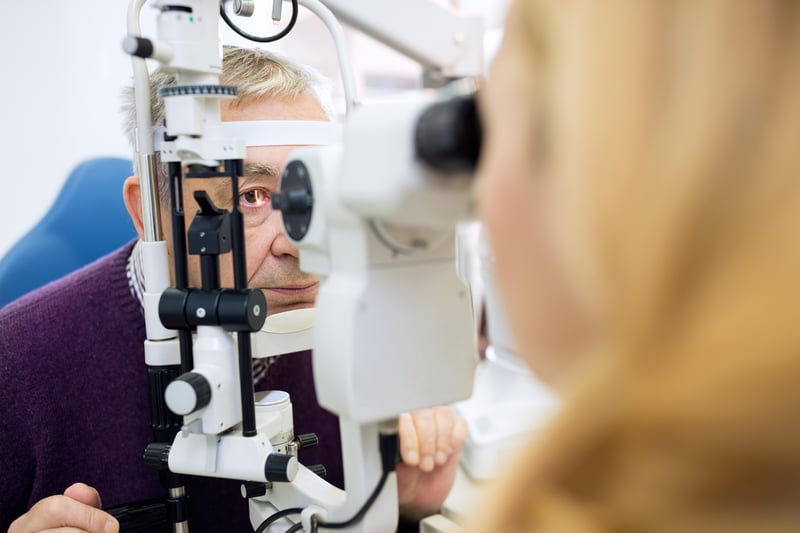Get Healthy!

- Steven Reinberg
- Posted December 7, 2022
Drug Choice Might Matter for Patients With Macular Degeneration
One of the two most common drugs used to treat age-related macular degeneration (AMD) appears better than the other, a new, small study suggests.
Among 106 patients with "wet" age-related macular degeneration, 50% of those treated with aflibercept (Eylea) could be weaned off the drug after one year, compared with only 17% of those treated with bevacizumab (Avastin), researchers found.
"The results from this study point to an additional, previously unappreciated advantage of aflibercept over bevacizumab," said lead researcher Dr. Akrit Sodhi, an associate professor of ophthalmology at Johns Hopkins University School of Medicine in Baltimore. "The improved ability to wean patients off therapy will need to be considered when choosing between these two medications."
The findings suggest that aflibercept's much higher price tag -- it costs about $2,000 per treatment while bevacizumab costs only $100 per treatment -- might be worth it. The study was funded by the U.S. National Eye Institute.
AMD is the most common cause of vision loss among people 50 and older, affecting more than 7 million Americans. Of these, nearly 2 million who suffer from advanced AMD will lose their vision, the researchers noted.
These patients include those who have wet AMD, which is characterized by the growth of abnormal blood vessels in the retina that can bleed or leak damaging fluids into light-sensing tissue.
Treatment of wet AMD requires monthly or bimonthly eye injections of drugs that slow or stop the growth of these leaky blood vessels and, in most cases, prevent further vision loss.
These treatments cause discomfort and carry the risk of retinal detachment, infection and other side effects. They also require seeing a doctor for injections, which can make for inconsistent care, Sodhi said.
In the study, Sodhi's team studied the medical records of 106 patients with wet AMD seen at Johns Hopkins between 2013 and 2020.
Patients were considered weaned off treatment if they had stable vision and did not need an eye injection for at least 30 weeks after their last treatment.
The researchers found that after the first three monthly injections, patients given aflibercept had a small advantage over bevacizumab in improved vision. But at six months, the advantage of aflibercept was no longer seen.
When the time between treatments was extended, however, those receiving bevacizumab had more vision loss than those given aflibercept, the researchers noted.
At one year, 30 of 60 patients treated with aflibercept were weaned off therapy, compared with eight of 46 treated with bevacizumab, the researchers found. The researchers then monitored 56 of the 106 patients for an additional year, and found that 48% of patients treated with aflibercept remained off treatment, compared with 28% of patients staying off bevacizumab.
For those who still needed treatment, the intervals between injections was 44% longer for patients treated with aflibercept than those treated with bevacizumab.
The report was published recently in the Journal of Clinical Investigation.
One ophthalmologist who reviewed the findings noted that stopping medication can be tricky.
"These results are very intriguing, and though it is a small study, it does come to a conclusion that I think many retina specialists share in that the potency and effect of aflibercept [whether for wet AMD or diabetic macular edema] seems to be better than bevacizumab in most patients," said Dr. Philip Ferrone, a professor of ophthalmology at Hofstra University Medical School in Hempstead, N.Y.
"We see this time and time again in clinical practice," he said. "But stopping therapy altogether in wet AMD has to be done carefully, since it is a chronic degenerative disease, and as we age, the degeneration continues. So for most people, the need for the drug at some interval is likely."
Another expert, however, isn't convinced by the study's conclusions.
The small number of patients and the differences in injection schedules weaken the findings, said Dr. Abdhish Bhavsar, a clinical spokesperson for the American Academy of Ophthalmology.
"Although they report that eyes with bevacizumab had more injections and fewer instances of weaning off the medication, there are significant weaknesses in the study design," he said.
"In the absence of a prospective, randomized study, there is the potential for substantial bias -- enough to change the outcome, results and conclusions -- in the selection of the drug and also in the decision for treating and extending injections, since we are all biased into thinking that aflibercept should outlast bevacizumab based on other randomized clinical trials," Bhavsar said.
More information
For more on macular degeneration, see the American Academy of Ophthalmology.
SOURCES: Akrit Sodhi, MD, PhD, associate professor, ophthalmology, Johns Hopkins University School of Medicine, Baltimore; Abdhish Bhavsar, MD, clinical spokesperson, American Academy of Ophthalmology; Philip Ferrone, MD, professor, ophthalmology, Hofstra University Medical School, Hempstead, N.Y.; Journal of Clinical Investigation, Nov. 22, 2022, online







